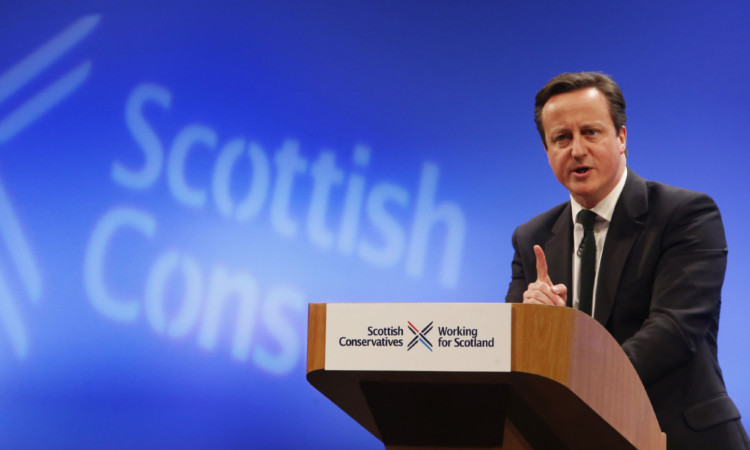David Cameron has signalled his desire to devolve more tax-raising powers to Scotland in the event the country votes No to independence.
However, the Prime Minister stopped short of absolutely guaranteeing further devolution to Holyrood as he addressed the Scottish Conservative conference, instead saying staying in the UK “can” lead to greater powers.
The Scotland Act will see further tax powers given to the Scottish Parliament in 2016 if there is a No vote, no matter what the UK parties vote through Westminster.
After being introduced to the party faithful by Scottish leader Ruth Davidson, he insisted offering more responsibility is not a consolation prize for the SNP.
“Let me be absolutely clear: a vote for No is not a vote for no change,” Mr Cameron said.
“We are committed to making devolution work better still. Not because we want to give Alex Salmond a consolation prize if Scotland votes No, but because it’s the right thing to do.
“Giving the Scottish Parliament greater responsibility for raising more of the money it spends that’s what Ruth believes, and I believe it too.
“So here’s the re-cap: vote Yes, that is total separation. Vote No, that can mean further devolution more power to the Scottish people and their parliament, but with the crucial insurance policy that comes with being part of the UK.”
The Prime Minister also praised the “spirit” of the Scottish party, which has just one MP north of the border, as he insisted: “Our values are Scotland’s values”.
He defended interventions from the president of the European Commission, BP, Shell, RBS and Barclays and accused the Yes campaign of being “irresponsible”.
Mr Cameron said: “There’s the myth that any talk about the consequences of separation is all bluff and bluster, or even bullying warnings on the currency, warnings on the EU.
“The Nationalists say this is a big political conspiracy from south of the border, just ignore it.
“But that is wrong and, frankly, irresponsible.”
As he insisted he was making the “positive case” for the Union, Mr Cameron argued the UK coalition’s “serious long-term economic plan” for the UK was working in Scotland, citing Dundee’s computer games industry as one positive example.
The Prime Minister went on to emphasise the UK’s shared history, values, identity and culture, touching on events such as the First World War, the Commonwealth Games and the Olympics, quoting bronze medal winning Courier columnist Eve Muirhead in the process.
Yes Scotland chief executive Blair Jenkins branded the Prime Minister’s devolution hint a “sham”.
He added: “Mr Cameron saying only that a No vote ‘can’ lead to greater powers for Holyrood is a huge blow to the credibility of the No Campaign.”
